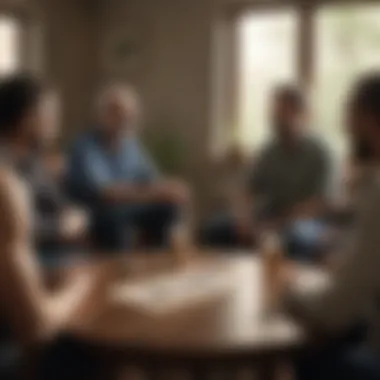Support Groups for Veterans with PTSD: Building a Path to Recovery


Understanding Relationship Dynamics and Challenges
Support groups for veterans dealing with PTSD play a pivotal role in comprehending relationship dynamics and navigating through associated challenges. These groups offer a safe haven where individuals can share their experiences, emotions, and concerns with like-minded peers who understand the magnitude of their struggles. The shared camaraderie fosters a sense of belonging and acceptance—an essential element in overcoming the isolating nature of PTSD. Within these support groups, veterans encounter common relationship issues faced by many men who have served in the military.
Common Relationship Issues Faced by Men
Veterans often grapple with trust issues, emotional numbness, and difficulty expressing their feelings, which can strain their relationships with loved ones. The emotional toll of their experiences can lead to strained communication and a sense of detachment. Moreover, the challenges of reintegrating into civilian life after deployment can create tension within family dynamics. Recognizing and addressing these issues is crucial for veterans to build healthy and fulfilling relationships.
Effective Communication Techniques
In support groups, veterans are encouraged to explore and practice effective communication strategies to improve their interpersonal relationships. Active listening, assertiveness, and empathy are key components of successful communication. By honing these skills, veterans can express their thoughts and emotions more clearly, fostering understanding and connection with their peers and loved ones. Effective communication techniques empower veterans to navigate complex relationship dynamics with confidence and compassion.
Strategies for Resolving Conflict
Conflict resolution is a critical aspect of maintaining healthy relationships, especially for individuals grappling with PTSD. Support groups provide a platform for veterans to learn and apply strategies for resolving conflicts constructively. Techniques such as compromise, active problem-solving, and de-escalation help veterans navigate disagreements and misunderstandings with resilience and diplomacy. By equipping veterans with conflict resolution skills, these groups empower individuals to foster harmonious relationships and emotional well-being.
Personal Growth and Development
As veterans engage in support groups for PTSD, they embark on a transformative journey of personal growth and development. These groups offer a nurturing environment where individuals can explore self-improvement strategies, set meaningful goals, and enhance their overall well-being.
Self-Improvement Tips for Men
Veterans participating in support groups are introduced to various self-improvement tips tailored to their unique experiences and challenges. From cultivating mindfulness and resilience to exploring creative outlets, these tips empower veterans to embark on a journey of self-discovery and growth. Embracing personal development enables veterans to navigate the complexities of PTSD with strength and determination.
Setting Goals and Achieving Success
Setting realistic and attainable goals is key to fostering a sense of purpose and direction in the lives of veterans coping with PTSD. Support groups offer guidance on setting actionable goals that align with one's values and aspirations. By encouraging veterans to chart their path to success, these groups instill a sense of agency and motivation, driving individuals towards personal fulfillment and achievement.
Managing Stress and Wellness
The journey towards recovery from PTSD involves managing stress and prioritizing overall wellness. Support groups equip veterans with coping mechanisms and wellness strategies to navigate the psychological and emotional challenges they face. From mindfulness practices to stress-reduction techniques, these tools enable veterans to cultivate resilience, balance, and inner peace. By prioritizing self-care and well-being, individuals enhance their capacity to combat the effects of PTSD and nurture their mental health.
Masculine Lifestyle Choices
Men's Fashion and Grooming Tips
Support groups provide a space for veterans to explore fashion and grooming choices that resonate with their personal style and identity. From wardrobe essentials to grooming routines, these tips empower veterans to express themselves confidently and authentically. Embracing personal style enhances self-esteem and fosters a positive self-image, contributing to overall well-being.
Health and Fitness Guidance


Prioritizing health and fitness plays a crucial role in the recovery journey of veterans dealing with PTSD. Support groups offer guidance on establishing sustainable workout routines, making healthy nutritional choices, and prioritizing physical well-being. By incorporating health and fitness into their lifestyle, veterans enhance their resilience, energy levels, and overall health, paving the way for holistic well-being.
Exploring Hobbies and Interests
Encouraging veterans to explore hobbies and interests is instrumental in enhancing their quality of life and overall satisfaction. Support groups advocate for the pursuit of hobbies that ignite passion and creativity, fostering a sense of purpose and joy. Whether delving into artistic pursuits, outdoor activities, or intellectual interests, exploring hobbies promotes self-discovery, stress relief, and meaningful connections within the community.
Building Strong Connections
As veterans engage in support groups for PTSD, the significance of building strong connections and nurturing relationships emerges as a foundational pillar of their recovery journey. These groups emphasize the importance of fostering meaningful friendships, nurturing romantic relationships, and leveraging effective networking techniques to cultivate a supportive and enriching social environment.
Strengthening Friendships and Social Circles
Support groups provide veterans with a platform to strengthen existing friendships and forge new connections with peers who understand their experiences. The bond formed through shared struggles and camaraderie fosters a sense of community and belonging, reducing feelings of isolation and fostering mutual support. By nurturing friendships and social circles, veterans establish a network of allies who provide empathy, understanding, and camaraderie.
Nurturing Romantic Relationships
Navigating romantic relationships can be a complex journey for veterans coping with PTSD. Support groups offer insights and guidance on fostering healthy and supportive romantic partnerships based on communication, mutual respect, and empathy. By nurturing romantic relationships within a supportive community, veterans enhance their emotional well-being, communication skills, and ability to cultivate deep and meaningful connections with their partners.
Effective Networking Techniques
Networking plays a crucial role in expanding opportunities and establishing supportive connections in the lives of veterans. Support groups emphasize the importance of effective networking techniques, such as building rapport, maintaining professional relationships, and leveraging shared experiences. By honing networking skills, veterans enhance their social capital, access valuable resources, and create opportunities for personal and professional growth.
Enhancing Emotional Intelligence
Understanding and Regulating Emotions
Understanding and regulating emotions are essential components of emotional intelligence for veterans grappling with PTSD. Support groups offer insights into emotional awareness, emotional triggers, and coping mechanisms to navigate intense feelings with resilience and clarity. By honing emotional regulation skills, veterans develop a deeper understanding of their emotional landscape and cultivate healthy responses to challenging situations.
Empathy and Compassion in Relationships
Empathy and compassion form the cornerstone of healthy and fulfilling relationships within the context of PTSD recovery. Support groups encourage veterans to cultivate empathy towards themselves and others, fostering supportive and compassionate relationships. By embracing empathy and compassion in their interactions, veterans build trust, understanding, and resilience in their connections, fostering a sense of emotional closeness and bonding.
Cultivating Healthy Boundaries
Establishing and maintaining healthy boundaries is essential for veterans navigating relationships within the context of PTSD recovery. Support groups provide guidance on setting boundaries, asserting personal limits, and advocating for one's needs and well-being. By cultivating healthy boundaries, veterans safeguard their emotional and mental health, establish mutual respect in relationships, and foster a sense of autonomy and self-preservation.
Understanding PTSD in Veterans
Understanding PTSD in Veterans is a crucial aspect of this article as it delves into the mental health challenges faced by veterans. By exploring the prevalence of PTSD among veterans and the factors contributing to it, this section sheds light on the unique struggles that military personnel endure. Understanding PTSD is key to addressing the needs of veterans and providing them with the support necessary for recovery and improved well-being.
Prevalence of PTSD Among Veterans


When considering the Statistics on PTSD Rates in the Veteran Population, it becomes evident that a significant number of veterans are affected by this mental health condition. Understanding these statistics is vital as it showcases the widespread impact of PTSD within the veteran community. Factors Contributing to PTSD in Military Personnel are diverse and complex, ranging from combat experiences to reintegration challenges. Acknowledging these factors is essential to tailor support programs effectively.
Challenges Faced by Veterans with PTSD
The Impact on Mental Health and Well-being among veterans with PTSD is profound, affecting their overall quality of life. Exploring this impact helps in understanding the depth of the challenges faced by veterans and the importance of providing appropriate care and support. Barriers to Seeking Help and Treatment hinder veterans from accessing the assistance they need, emphasizing the necessity of addressing these barriers to ensure veterans receive the care they deserve.
Benefits of Support Groups for Veterans
Building a Supportive Community
Creating a Safe Space for Sharing Experiences:
Creating a safe space within support groups allows veterans to express themselves without fear of judgment. It encourages open and honest communication, enabling individuals to share their vulnerabilities and experiences openly. This inclusive environment fosters trust and facilitates meaningful connections among members, fostering a sense of solidarity and mutual support.
Fostering Mutual Understanding and Empathy:
By fostering mutual understanding and empathy, support groups help veterans feel heard and validated. The emphasis on empathy encourages members to listen actively, empathize with each other's struggles, and offer support without prejudice. This mutual understanding creates a sense of cohesion within the group, promoting an environment of compassion and camaraderie.
Peer Support and Camaraderie
Sense of Belonging and Connection:
Support groups provide veterans with a sense of belonging and connection, reducing feelings of isolation and loneliness. The camaraderie within these groups helps individuals feel understood and accepted, fostering a sense of community and shared experiences. This support network strengthens relationships and promotes a feeling of inclusivity among members.
Validation of Feelings and Experiences:
Validation plays a crucial role in the healing process for veterans with PTSD. Support groups offer a platform where members can validate each other's feelings and experiences, acknowledging the challenges they face. Feeling validated helps individuals recognize the legitimacy of their emotions and experiences, instilling a sense of empowerment and self-worth.
Access to Resources and Information
Educational Workshops and Counseling Services:
Support groups often organize educational workshops and provide access to counseling services to enhance members' coping mechanisms. These resources offer valuable information on PTSD, coping strategies, and mental health management. By engaging in these workshops, veterans gain knowledge and skills to navigate their challenges effectively.
Referrals to Mental Health Professionals:
Support groups facilitate referrals to mental health professionals for targeted interventions and specialized care. This collaborative approach ensures that veterans receive comprehensive support tailored to their individual needs. By connecting members with mental health experts, support groups reinforce the importance of professional guidance in managing PTSD and promoting recovery.
Peer-Led Support Groups
Peer-led support groups, a cornerstone in the realm of PTSD recovery, offer valuable insights and shared experiences that resonate deeply with veterans. In the context of Informal Gatherings and Discussions, veterans engage in open dialogues and exchanges that create a safe and empathetic environment conducive to healing. Emphasizing connection and camaraderie, these gatherings foster a sense of belonging and understanding among participants. On the other hand, Sharing Coping Strategies and Wellness Tips within these groups equips veterans with practical tools and techniques to navigate challenges effectively. By exchanging coping mechanisms and wellness tips, veterans empower each other towards sustained recovery and improved mental well-being.


Professional-Led Therapy Groups
Professional-led therapy groups provide structured sessions guided by licensed therapists, ensuring a comprehensive approach towards addressing PTSD. Through Structured Sessions with Licensed Therapists, veterans benefit from evidence-based interventions tailored to their specific needs and challenges. The structured nature of these sessions ensures a focused and goal-oriented therapy experience, enhancing the effectiveness of the treatment provided. On the other hand, Evidence-Based Interventions and Treatment Modalities employed within these groups underline the importance of research-backed approaches in promoting recovery. By integrating evidence-based practices into therapy sessions, veterans receive targeted interventions that are proven to yield positive outcomes, thereby optimizing their journey towards mental wellness.
Guidelines for Joining and Participating in PTSD Support Groups
Within the realm of support groups for veterans grappling with PTSD lies a crucial component that often serves as the linchpin for their efficacy - guidelines for joining and participating. These guidelines provide a structured framework for veterans to engage with these support groups effectively and derive maximum benefit from their interactions. By outlining the dos and don'ts, expectations, and boundaries within these groups, these guidelines set the tone for a safe and constructive space where veterans can navigate their healing journey.
Seeking Relevant Support Networks
Joining a PTSD support group begins with the pivotal step of seeking relevant support networks. This aspect entails leveraging the knowledge and expertise of mental health professionals to guide veterans towards suitable support groups tailored to their specific needs. Recommendations from mental health professionals serve as a compass in the vast landscape of available support options, ensuring veterans are directed to groups that align with their therapeutic requirements.
Online Resources for Finding Local Groups
In the digital age, the internet plays a pivotal role in connecting individuals with resources, and for veterans seeking PTSD support groups, online platforms offer a convenient avenue for finding local groups. These resources serve as virtual gateways to a plethora of support networks, enabling veterans to explore various group options based on location, focus areas, and compatibility. Despite the advantages of online resources in widening access to support groups, potential limitations such as the credibility of information and the absence of face-to-face interactions should also be considered.
Active Involvement and Engagement
Active involvement is the lifeblood of any support group, and in the context of PTSD, it is paramount for veterans to actively engage in group dynamics to harness the full potential of these communities. One crucial aspect of active involvement is maintaining open communication and a willingness to share one's experiences and challenges. By fostering a culture of transparency and vulnerability, veterans can deepen their connections within the group and benefit from diverse perspectives and shared wisdom.
Respect for Confidentiality and Boundaries
Respect for confidentiality and boundaries forms the bedrock of trust within PTSD support groups, ensuring that veterans feel secure in sharing their innermost thoughts and feelings. Upholding these principles nurtures a secure environment where individuals can disclose their vulnerabilities without fear of judgment or breach of privacy. By recognizing and honoring the confidentiality norms established within these groups, veterans uphold a mutual commitment to creating a safe and supportive space conducive to healing and growth.
The Impact of Support Groups on Veterans' Recovery
Support groups play a critical role in the recovery journey of veterans dealing with PTSD. These groups offer a nurturing environment where veterans can connect with others who share similar experiences, fostering a sense of belonging and understanding. By participating in support groups, veterans gain access to valuable emotional support, coping strategies, and a safe space to express their feelings and challenges. This supportive community helps combat the feelings of isolation and loneliness often experienced by individuals dealing with PTSD, promoting healing and resilience.
Enhanced Coping Mechanisms and Resilience
Development of Healthy Coping Skills
Developing healthy coping skills is a cornerstone of PTSD recovery within support groups. These skills empower veterans to effectively manage stress, anxiety, and trauma triggers. By learning to identify and implement healthy coping strategies, such as mindfulness techniques, breathing exercises, and self-care practices, veterans can enhance their emotional well-being and resilience. The cultivation of healthy coping skills equips individuals with the tools needed to navigate challenging situations and regulate their emotions, promoting long-term stability and recovery.
Building Emotional Resilience and Self-Efficacy
Building emotional resilience and self-efficacy are essential components of veterans' recovery journeys. Through participation in support groups, veterans have the opportunity to strengthen their emotional resilience by sharing experiences, learning from others, and receiving encouragement and support. By enhancing their self-efficacy, veterans can regain a sense of control over their lives, build confidence in their ability to cope with adversity, and improve their overall mental outlook. This resilience and self-efficacy serve as protective factors against future traumatic events and contribute significantly to veterans' long-term recovery and well-being.
Long-Term Well-being and Quality of Life
Improvement in Symptoms and Functioning
Participating in support groups has been shown to contribute to the improvement of symptoms associated with PTSD, such as intrusive thoughts, nightmares, and hypervigilance. Through the continuous support and guidance offered within these groups, veterans can experience a reduction in symptom severity, improved emotional regulation, and enhanced overall functioning. By addressing these symptoms in a supportive environment, veterans can work towards better mental health outcomes and a higher quality of life.
Positive Changes in Social Relationships
Support groups not only impact individual well-being but also foster positive changes in veterans' social relationships. By connecting with peers who understand their struggles, veterans can develop meaningful connections and overcome feelings of isolation. These improved social relationships can lead to increased social support, reduced feelings of alienation, and a sense of community. As veterans build healthier interpersonal connections through support groups, they are more likely to experience improved social skills, communication, and a greater sense of belonging and acceptance.



